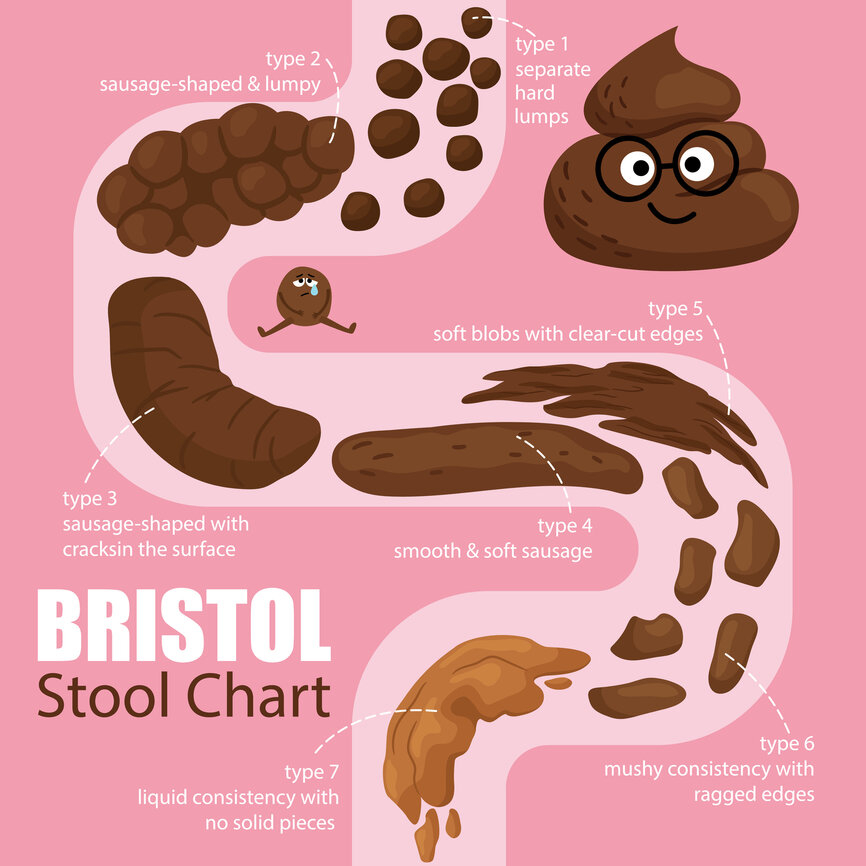Do you ever think about how often you poop? If you’re noticing a lack of “movement” lately, it’s probably time to assess if you’re constipated.
According to the National Institute of Health, constipation accounts for over 2.5 million doctor visits per year in the US.
Maybe you’ve recently found yourself flipping through the People magazine in the bathroom basket a few extra times. It happens to the best of us. And if you’re one of the roughly 4 million people who experience frequent constipation, you know that it’s about a lot more than beefing up on your magazine subscriptions.
A healthy digestive system means ideally eliminating at least once per day. And if you’ve ever gone a few days without any bowel movements, you know it can be downright miserable.
Pooping is a crucial part of your everyday health, so it’s wise to stay on top of the consistency and even appearance of your stools.

Chronic constipation causes issues like gas, bloating, weight gain, acne, headaches, and lower back pain. And if left untreated, it can lead to more serious diseases down the line, like colon cancer and even Parkinson’s disease.
Does all this poop talk make you uncomfortable? You’re not the only one.
As a culture that’s so often obsessed with the number on a scale, you’d think we’d be more open to taking a closer look at what’s coming out of our bodies.
If you ask us, something we all do on a daily (hopefully!) basis shouldn’t be such a taboo topic. As children, we all loved talking about our poop. And after we go, we get supercharged with energy.
So we say it’s time to give poop the spotlight it deserves!
Let’s talk about some ways you can tell if you’re constipated.
You’re not going as frequently or easily.
Perhaps you haven’t been visiting the toilet for more than a quick pee break, or you’re finding yourself feeling “heavy” but no matter how much you try you can’t seem to poop.
You’re going, but fewer than three times weekly.
As we said earlier, once per day is the standard of healthy bowel activity. But even every other day can be acceptable. Fewer than three times each week is a sign that your gut needs some TLC.
Your stools are small, dry, and hard.
If you struggle and pass nothing but small hard lumps, you’re dealing with constipation. Even larger lumpy stools can be a problem. The ideal stool consistency is a smooth, sausage shape. Take a look at the Bristol Stool Chart above to get a better idea of how these should look!
Lately you’re experiencing gas and cramping.
When your body is having a hard time moving something through your system, gas builds up and causes uncomfortable bloating and cramping.
It’s not that you’re not going regularly – you’re just feeling like there’s more there that isn’t coming out.
A feeling of incompleteness when you go can point to constipation. Ideally your stools should pass easily and completely, with no “unfinished business” sticking around.
If you’re going pretty regularly but something feels off, there’s an easy test that can help you determine if constipation is a factor.
We’re talking, of course, about our beloved Beetroot test. This test shows you the length of time it takes food to make its way through your digestive system.
Try it out and see how many days it takes for you to see the vibrant color of the red beets in your stool. A healthy transit time is generally between 12 to 24 hours. If it takes longer than this for your poops to take on a magenta hue, you’re probably constipated.
Okay, so now you know what to look for – but how do you find relief?
Start by taking a look at what might be causing your constipation. Not drinking much water or eating a lot of fiber? Try adding more water and green leafy vegetables, legumes, or some flax seeds to your day and see if it makes a difference.
Another common constipation culprit is hidden food allergies. A whopping 90% of Americans have food sensitivities, and most of those people have no clue that the food they’re eating so often is causing problems!
The Conscious Cleanse is designed to help you identify any lurking food allergies or sensitivities.
When you cleanse, you’ll learn how to get curious about what you put in your mouth. You’ll eliminate the most common food allergens for 14-days, then systematically reintroduce foods back into your diet. It’s the perfect way to reset your digestion and figure out if something you’re eating is keeping you stopped up.
Want to cleanse with us? Our next Group Cleanse starts September 13, and we’d love to have you there! Just click the button below to join and say goodbye to your digestive woes.
Cheers to healthy bowel movements!
The Conscious Cleanse Team
If you liked learning more about your gut health, we invite you to join our online community! When you sign up you’ll receive regular healthy lifestyle tips and new recipes. As a welcome-gift, we’ll send you our Green Smoothie eCookbook, a collection of more of our favorite easy smoothie recipes!
Welcome! We’re so glad you’re here.






